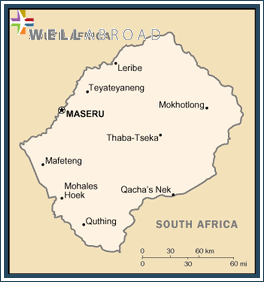|
MOST RECENT ALERTS
There's no recent alert.
|

|
|||||||||||||||
| COUNTRY OVERVIEW | ||||||||||||||||
|---|---|---|---|---|---|---|---|---|---|---|---|---|---|---|---|---|
|
| COUNTRY GENERAL INFORMATION | |||||||
|---|---|---|---|---|---|---|---|
| Language: |
Sesotho (southern Sotho), English (official), Zulu, Xhosa |
||||||
| Currency: | Lesotho Loti (LSL); South African Rand (ZAR) | ||||||
| Predominant Religions: |
Christian 80%, indigenous beliefs 20% |
||||||
| National Holidays: | Independence Day, 4 October (1966) | ||||||
| Economic Status: |
Small, landlocked, and mountainous, Lesotho relies on remittances from miners employed in South Africa and customs duties from the Southern Africa Customs Union for the majority of government revenue. The extreme inequality in the distribution of income remains a major drawback. |
||||||
| Security: |
Lesotho Defense Force (LDF): Army and Air Wing |
||||||
| US Presence: | |||||||
| Document Requirements: |
A passport is required, but no visa is needed for U.S. citizens visiting for 180 days or less. Vaccination for yellow fever is a common requirement and travelers should carry their international vaccination cards with them. For more information concerning entry requirements, travelers may contact the Embassy of the Kingdom of Lesotho, 2511 Massachusetts Avenue NW, Washington, DC 20008, telephone (202) 797-5533. Visit the Embassy of Lesotho’s website for the most current visa information. Information about dual nationality or the prevention of international child abduction can be found on our web site. For further information about customs regulations, please read our Customs Information sheet. Some HIV/AIDS entry restrictions exist for visitors to and foreign residents of Lesotho. Lesotho border guards have the discretion to deny entry to visitors with HIV/AIDS. Please verify this information with the Embassy of Lesotho before you travel. |
||||||
| Major Airports: |
Airports: 28, Airports w/paved runways: 3 |
||||||
| Servicing Airlines: |
|
||||||
| Risks and Precautions: |
U.S. citizens should avoid political gatherings and street demonstrations and maintain security awareness at all times. U.S. citizens should remain vigilant about their surroundings at all times. Lesotho has a high level of crime and foreigners are frequently targeted, robbed and sometimes killed. Police have reported the presence of a number of armed gangs. Lesotho’s high unemployment rate, aggravated by the return of large numbers of unemployed miners from South Africa, and the ongoing effects of social upheaval due to high HIV/AIDS rates of infection, have contributed to an increasing number of armed robberies, break-ins, and incidents of carjacking. These types of crimes occur primarily in the capital city of Maseru, but can occur elsewhere in Lesotho. Crime scenes have included popular restaurants, and other locations foreigners are known to frequent. Victims have included foreign diplomats and members of foreign aid missions. U.S. citizens are advised to avoid large groups and demonstrations, and not to walk in the city even during daylight. Personal crime is more likely to occur at night, but there have been numerous recent incidents in the middle of the day. Traveling alone or at night is particularly dangerous. |
||||||
| Mortality Statistics: |
Infant MR total: 79.85 deaths/1,000 live births Life expectancy at birth: TOTAL 39.97 years (male 40.73/female 39.18) |
||||||
| Immunization Indicators: |
Required: None Recommended: Hep A & B, Rabies, Typhoid |
||||||
| Infectious Disease Concerns: |
Dengue, filariasis, leishmaniasis, onchocerciasis (river blindness), African tick bite fever, a rickettsial infection, and African trypanosomiasis (African sleeping sickness) are other diseases carried by insects that also occur in Southern African countries, mostly in rural areas. Schistosomiasis is found in fresh water in Southern African countries. Polio reappeared in 2006 in Namibia. Imported cases in neighboring countries have occasionally occurred. Many countries in this region have high incidence rates of tuberculosis and high HIV prevalence rates. |
||||||
| Overall Quality of Medical Services: |
Medical facilities in Lesotho are limited. Good medical service is available in Bloemfontein, South Africa, 90 miles west of Maseru. There is no reliable ambulance service in Lesotho. |
||||||
| Providers in Network: |
|
||||||
| Recent Medical Threats/ Concerns/Warnings: |
Lesotho has a very high HIV/AIDS prevalense rate, currently estimated at over thirty percent of the adult population. |
||||||
| Communications Info: |
Country Calling Code: +266 Internet Country Code: .is |
||||||






